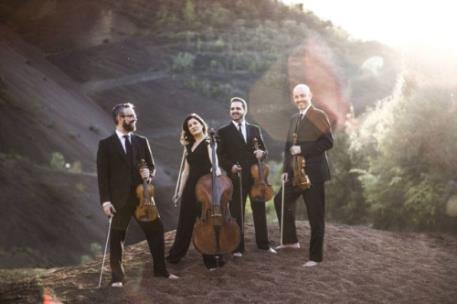St. Paul’s Artist Series presents Spain’s internationally renowned string quartet, Cuarteto Quiroga -Aitor Hevia and Cibrán Sierra, violins; Josep Puchades, viola; and Helena Poggio, cello - performing works by Juan Crisóstomo Arriaga (String Quartet No. 1 in D Minor), Alberto Ginastera (String Quartet No. 1, Op. 20), and Ludwig van Beethoven (String Quartet No. 16 in F Major, Op. 135).
The concert takes place at St. Paul’s Episcopal Church, 305 W. Seventh at Pine St., on Friday, March 1 at 7:30 p.m. Tickets can be purchased in advance through the St. Paul’s website and will also be sold at the door on the night of the concert.
Paul Thomas, director of Music at St. Paul’s says, “We invite audiences to hear this extraordinary music in our beautiful space. We hope that these concerts provide an opportunity to leave the distractions of daily life and come away feeling renewed.”
About the artists:
“A beautiful tone combined with an unblemished technique” (Strad Magazine) “… perfect intonation, flawless balance, perfectly clear textures…” (La Paz de Galicia)
Cuarteto Quiroga, recent winner of Spain’s National Music Prize and appointed first quartet-inresidence in charge of the Royal Collection of decorated Stradivarius instruments at Madrid’s Royal Palace, has established itself as one of the most dynamic and unique quartets of its generation, winning international acclaim from critics and audiences alike for its distinctive personality as well as its bold and original approach to the string quartet repertoire. The quartet honors the memory of Galician violinist Manuel Quiroga, an early 20th century virtuoso who was considered among Spain’s outstanding instrumentalists.
In describing their program, members of Cuarteto Quiroga note: “We always try to create programs that offer the audience a meaningful experience. A concert should be more than a collection of beautiful pieces; it should tell a story and invite the listener to reflect on the music being performed. Our program in Chattanooga will encompass the range of the string quartet repertoire, including an elegant early 19th century quartet by the youthful Juan Arriaga, called
“the Spanish Mozart;” followed by 20th century Argentine composer Alberto Ginastera’s Quartet from 1948 which combines Argentine folk themes with spikey modern tonalities. We conclude with Beethoven’s String Quartet No. 16, Op 135, written in 1826, the last year of his life and considered the culmination of his art. In the last movement, titled ‘The Difficult Decision,” he writes in the score, ‘Must it be?’ and responds later, ‘It must be.’ As musicians we endeavor to build an eloquent interpretation that will bring our audiences closer to the beauty and joy we find in this music.”
